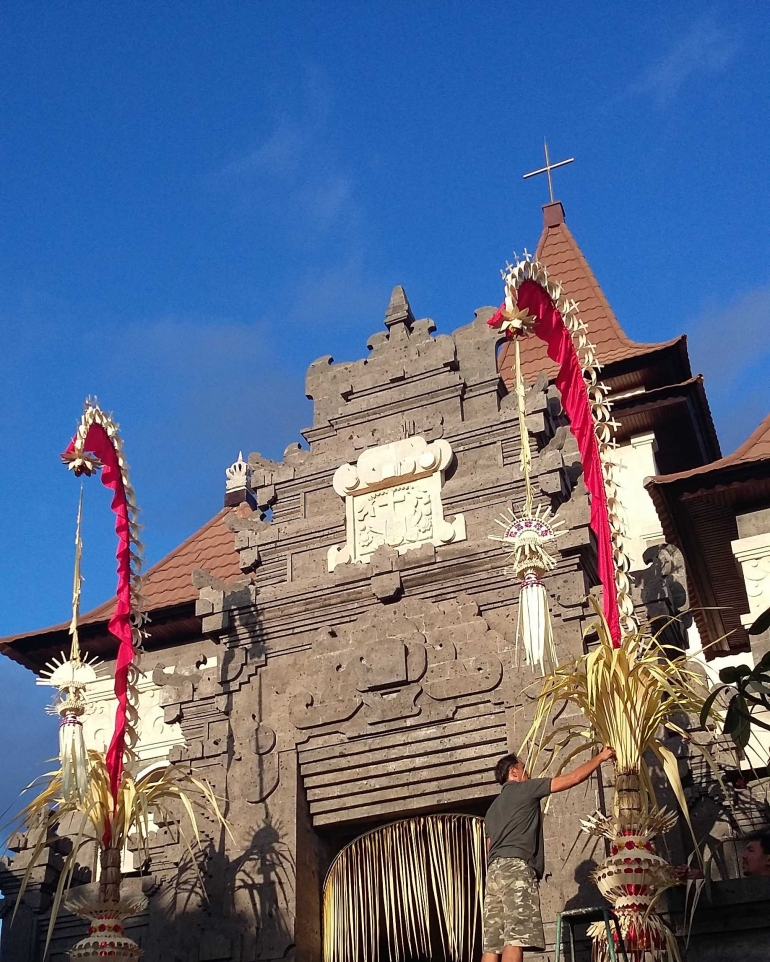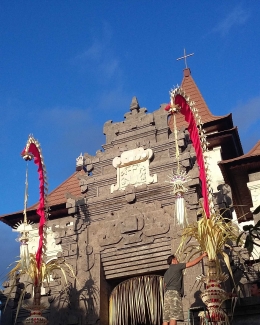I am a Christian Balinese. And when I say 'Balinese' I meant ethnic Balinese, not simply someone living in Bali. I do have traditional Balinese name (my full name is Gede Benny Setia Wirawan, Gede being a traditional Balinese name). My parents are both Balinese with Christian faith. No, they are not new converts. In fact, I am fourth generation Christian. The first convert in my lineage is my great grandfather, one of the first Balinese to be baptized.
That was an explanation that I had to repeat times and again. Most people around me, Balinese or otherwise, never take me for a Christian. I have rather dark skin and I speak Balinese quite fluently. Thus, they often take me for a Balinese. And in their perception, if you are a Balinese, you must be Hindu.
Most Balinese, especially those from rural villages, always assume a Balinese to be a Hindu. Those of other faiths must be migrants from other islands. This perception is understandable if you see how intertwined Balinese ethnic identity and Hindu religion are.
However, we do exist and there are thousands of us. Many of those my age are third or fourth generation Christian. And throughout our lineage, not once we abandon our Balinese identity. In each generation, we consistently preserve Balinese naming norm, a recognition of our roots. Many of us are raised in Balinese speaking household and speak good Balinese ourselves. We adhere to traditional Balinese values, which are not so dissimilar from Christian values.
Our Balinese identity also permeate our worship and spiritual life. Christian Balinese lineage is preserved and institutionalized in several synods in Bali, most notably Gereja Kristen Protestan di Bali(Protestant Christian Church in Bali). We incorporate Balinese architecture, both in appearance in philosophy, into our churches. We incorporate Balinese gamelans into our worship and liturgy. We danced Balinese dances and translate hymns into Balinese.
This acculturation went beyond superficial artifacts. Personally, I find Balinese culture, norms, and values to be analogous with Christian ones. So much so, in fact, that some aspects simply change names or place.
For Christian Balinese, the traditional banjar(sub-village community, center of social and religious lives) is transferred to the congregation. Banjarinstitutions are simply translated, or inherently analogous, with congregational ones. Sekaatruna trunior youth groups translate into youth fellowships. Balinese congregations also have suka duka,a body which arrange community (banjarin traditional Balinese, congregation in Christian Balinese) to attend to members' needs, both happy and sad.
Christian Balinese also have similar social duties with their Hindu counterparts. Instead of directed to the banjaror other relevant religious communities, Christian Balinese direct these duties to their church and congregation. Where Hindus are expected to take part in taking care their puras, Christian Balinese do the same for their churches. If Hindu Balinese are expected to attend to community members during times of celebration or sorrow, so does Christian Balinese. After all, these concepts of interpersonal duties within a community of faith translate well from Christian concept of koinonia- fellowship.
Bottom line, Christian Balinese identify as both truly Christian and truly Balinese. We are not Christian playing to be Balinese. Nor are we a syncretic sect, combining Christianity and Hinduism. Although not identical, we are Christians which identify with, and practice, our cultural root: Balinese culture.
Ironically, despite calls among Balinese to preserve our traditional culture, our identification as Balinese sometime not well received. Rejection of our identity comes both covert and overt.
Sometime this rejection arise simply out of ignorance. Christian Balinese make up small percentage of an already small minority of Christians in Bali. Thus, many lives their entire lives without encountering a Christian Balinese. They are trapped in the stereotype that Balinese are all Hindus. Upon encounter, their first reaction is disbelief. Curious ones will ask about our unique background, thus I have to reiterate that first paragraph dozens of times, if not more. Those with open mind will then turn that disbelief into astonishment and it usually ends up with us discussing the uniqueness of Balinese culture, both traditional and Christian.








